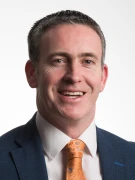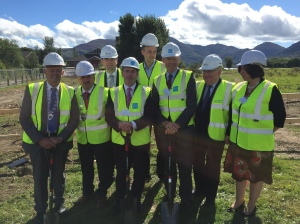CHECK AGAINST DELIVERY PLEASE
Speech by
MINISTER DAMIEN ENGLISH T.D.
Minister for Housing and urban Development
at the OCEAN Hero Awards
on
21st November 2017 at the Royal College of Physicians, Kildare Street, Dublin 2 @ 13:00.
Michael John, Clean Coast volunteers, distinguished guests, ladies and gentlemen.
It is my very great pleasure to be invited here today to present the 2017 An Taisce’s Ocean Hero Awards and I hope that you enjoyed the range of excellent and interesting contributions which were presented here this morning. Events like this provide a great opportunity to build networks and share experiences and most importantly, honour the invaluable contribution that Ireland’s coastal communities have made towards conserving our spectacular coastline.
For an island nation with one of the largest maritime areas in the European Union, the importance of the sea to Ireland cannot be overstated. We deeply value our marine and coastal environments in all their beauty and diversity, but increasingly we are aware of the growing threats from human activities that face complex marine ecosystems some of which remain unknown to science.
In this context, litter accumulating in the marine environment is a significant environmental issue facing the World today. The exact quantity of litter, including plastic in the ocean and volumes entering the ocean from waste generated on land or lost or discarded at sea is unknown and is the subject on ongoing extensive national and international research. Estimates vary widely, but there is no doubt that it exists in vast quantities with undetermined impacts and that levels of marine litter are growing at an unacceptable rate.
My Department is committed to working, both nationally and internationally, with our EU and OSPAR partners and national stakeholders, to determine the key sources of marine litter, the pathways by which it can enter the marine environment and the harm it causes. This will inform the development of our national and international measures to address the problem.
Ireland is already implementing a suite of measures identified in our Marine Strategy Framework Directive Programme of Measures to address this issue. This will be reviewed and updated on an ongoing basis as new marine litter sources and pathways are identified. Ireland will also continue to identify ways of treating plastic waste as a resource.
Ireland also supports the aims of the Plastics Strategy in the Circular Economy which aims to address the challenges posed by plastics across the value chain and take into account the entire life cycle. The implementation of programmes such as the Circular Economy package will, I believe, be a key measure in reducing marine litter inputs in the future.
Because of the transboundary nature of the problem, Ireland continues to cooperate collaboratively with international partners to try and identify the extent and impact of the problem and to develop solutions to address the issue in tandem with our EU partners under the Marine Strategy Framework Directive and the OSPAR Convention for the Protection of the Marine Environment of the North-East Atlantic.
It is important to note that the problem of marine litter is only one aspect of our marine environmental policy. We are also are working to ensure that :
- Biodiversity is maintained
- Non-indigenous species do not adversely alter the ecosystem
- The population of commercial fish species is healthy
- Elements of food webs ensure long-term abundance and reproduction
- Eutrophication (the impacts of sewage and nutrients such as fertiliser leading to loss of oxygen in the water is minimised
- Sea floor and seawaters are not altered in such a way as to harm ecosystems
- Contaminants in seafood are below safe levels
- Introduction of energy and underwater noise does not adversely affect the ecosystem
However, the problem of marine litter remains a particular focus for us at this time.
Raising public awareness and effecting societal change in environmental behaviour is very important when it comes to issues such as reducing marine litter. That is why my Department has a long-standing relationship with An Taisce and we are pleased to support initiatives administered by An Taisce, such as Clean Coasts and the Two Minute Beach Clean programmes. The recent Love Your Coast photography awards and similar projects represent just some of the many high profile and high value initiatives that An Taisce operates. These are tremendous vehicles for encouraging public participation and fostering a sense of environmental responsibility. They are considered exemplars in their field and worthy of support at home and replication abroad
It is also worth noting that exciting developments are ongoing in relation to the Green Schools module on marine environmental issues, especially litter. This is also administered by An Taisce and supported by my Department. It was piloted in a number of schools in 2016 and is currently being rolled out, on a nationwide basis, involving over 250 schools. I am convinced that this internationally ground breaking module will augment and dovetail with the current suite of green school offerings and will further educate the children of today and improve the environmental behaviours of tomorrow.
We regard these programmes as international best practice models and are keen to present them as such to our international partners in the EU and further afield. In recognition of this fact, the Government has committed to continue to support the Coast Care and Green Schools Global Citizenship Marine Environment programmes into the future. At the “Our Oceans” Conference in Malta in October, Irelandundertake to incorporate these initiatives among our formal measures to address the marine litter and environmental protection targets of the UN Sustainable Development Goals.
But today is about you, the Coast Care groups, Businesses, Schools and individuals, who give of your time and energy to make the marine environment a better place. The contribution of local communities and community based enterprises cannot be overstated. Your efforts are crucial in achieving and maintaining the aesthetical appeal and the amenity and economic value of the coastal resource. The work of coast care groups is actually making a tangible difference to the quality of our coastal environment, removing nearly 200 tonnes of litter from our coast annually. As well as environmental benefits, this has tremendous social and economic benefits, not least for our tourist industry.
I understand that there are over 600 active Coast Care groups, involving 18,000 volunteers, and representing a quarter of a million hours are dotted around the Irish coast. Your tireless activities, augmented by environmentally focussed enterprises and schools are both civically admirable and environmentally beneficial, and are rightly being recognised here today.
Attaining Ocean Hero awards does not come easily. It requires a lot of commitment, a lot of effort and a lot of civic spirit, which makes the achievement all the more satisfactory and recipients here today should be justifiably proud of their achievements. These awards are a tremendous example of community school and business collaborations and local and individual pride harnessed for the improvement of the marine environment. I think that the recipients here today, in the various categories, should feel enormously fulfilled in achieving these hard-won and much-sought-after accolades.
We, as current custodians of the marine environment have a duty and a responsibility to pass on a resource to be sustainably developed and enjoyed by future generations. But there is no room for complacency and as a society, we need to redouble our efforts in identifying and implementing environmentally sustainable solutions to current and future environmental challenges.
So, in conclusion, I hope you had a thought-provoking and enlightening seminar and I hope that you had an opportunity to share information and experiences over lunch. I am confident that, with the help of marine conscious stakeholders, like yourselves, that we are well positioned to deal with the significant environmental issues ahead.
It only remains for me to congratulate all those who have been nominated and will receive awards here today. You deserve recognition for the trojan efforts that you have made to help improve the quality of the marine environment.
Go raibh maith agaibh agus comhghairdeas.













